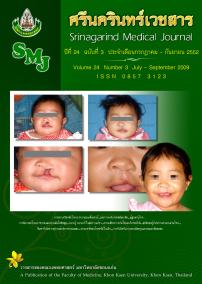ThaiScience
ThaiScience
SRINAGARIND MEDICAL JOURNAL
Volume 35, No. 02, Month MARCH, Year 2020, Pages 193 - 198
Incidence and predictive factors for post-operative delirium among older people
Kanokarn Kongpitee, Darawan Augsornwan, Wasitthe Setwong, Natthawadee Boonrueng, Parakorn Surakulprapa
Abstract Download PDF
Background and objectives: Delirium is a common symptom in older people who undergo surgery. When this condition occurs, it affect not only older people, but also caregivers and health service systems. This study aimed to study incidence and predictive factors with post-operative delirium among older people who were admitted to the surgical ward. Material and Method: This was a retrospective study . The population were 522 older people which age 60 years or above, had surgery and were admitted to surgical ward at Srinagarind hospital, Faculty of Medicine, Khon Kaen university between January 2013 – December 2015. Data were collected by reviewing medical records and nurse note for personal information and illness history, Thai version of Confusion Assessment Method (CAM-algorithm), and the recorded form which was developed by the researcher with Cronbach’s alpha coefficient as 0.83. Personal informations were analyzed by using descriptive statistics, however, correlation and prediction between factors were analyzed by using Pearson’s product moment correlation coefficient and stepwise multiple regression analysis. The significance level at p≤ 0.05 was applied. Results: The study showed that the incidence of post-operative delirium in older people was low (4.78 %). Factors that can be used to predict the post-operative delirium among older people were blood loss minutes, receive blood/fluid more than 300 cc, General analgesia and post-operative pain level of 24 hours between 8-10 points. These five factors together joining to predict and explain the occurrence of post-operative delirium (p <0.001) at 14% (R2 = .140) Conclusion: The incidence of post-operative delirium in older people was (4.78 %). Factors that could be used to predict the post-operative delirium among older people were blood loss more than 900 cc, using Patient-Controlled Analgesia, surgery duration more than 300 minutes, and post-operative pain level of 24 hours between 8-10 points. These five factors together joining to predict and explain the occurrence of post-operative delirium at 14 % (R2=.140 ).
Keywords
Incidence, predictive factors, older people, post-operation deliriumSRINAGARIND MEDICAL JOURNAL
Published by : Faculty of Medicine, Khon Kaen University
Contributions welcome at : http://www.smj.ejnal.com/e-journal/journal/index.php
